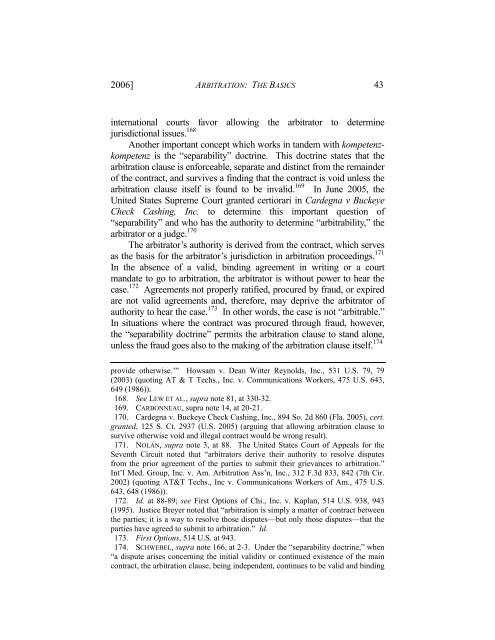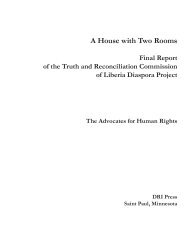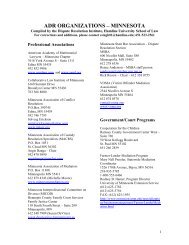2006/Vol. 5 No.1 - Hamline Law - Hamline University
2006/Vol. 5 No.1 - Hamline Law - Hamline University
2006/Vol. 5 No.1 - Hamline Law - Hamline University
Create successful ePaper yourself
Turn your PDF publications into a flip-book with our unique Google optimized e-Paper software.
<strong>2006</strong>] ARBITRATION: THE BASICS 43<br />
international courts favor allowing the arbitrator to determine<br />
jurisdictional issues. 168<br />
Another important concept which works in tandem with kompetenzkompetenz<br />
is the “separability” doctrine. This doctrine states that the<br />
arbitration clause is enforceable, separate and distinct from the remainder<br />
of the contract, and survives a finding that the contract is void unless the<br />
arbitration clause itself is found to be invalid. 169 In June 2005, the<br />
United States Supreme Court granted certiorari in Cardegna v Buckeye<br />
Check Cashing, Inc. to determine this important question of<br />
“separability” and who has the authority to determine “arbitrability,” the<br />
arbitrator or a judge. 170<br />
The arbitrator’s authority is derived from the contract, which serves<br />
as the basis for the arbitrator’s jurisdiction in arbitration proceedings. 171<br />
In the absence of a valid, binding agreement in writing or a court<br />
mandate to go to arbitration, the arbitrator is without power to hear the<br />
case. 172 Agreements not properly ratified, procured by fraud, or expired<br />
are not valid agreements and, therefore, may deprive the arbitrator of<br />
authority to hear the case. 173 In other words, the case is not “arbitrable.”<br />
In situations where the contract was procured through fraud, however,<br />
the “separability doctrine” permits the arbitration clause to stand alone,<br />
unless the fraud goes also to the making of the arbitration clause itself. 174<br />
provide otherwise.’” Howsam v. Dean Witter Reynolds, Inc., 531 U.S. 79, 79<br />
(2003) (quoting AT & T Techs., Inc. v. Communications Workers, 475 U.S. 643,<br />
649 (1986)).<br />
168. See LEW ET AL., supra note 81, at 330-32.<br />
169. CARBONNEAU, supra note 14, at 20-21.<br />
170. Cardegna v. Buckeye Check Cashing, Inc., 894 So. 2d 860 (Fla. 2005), cert.<br />
granted, 125 S. Ct. 2937 (U.S. 2005) (arguing that allowing arbitration clause to<br />
survive otherwise void and illegal contract would be wrong result).<br />
171. NOLAN, supra note 3, at 88. The United States Court of Appeals for the<br />
Seventh Circuit noted that “arbitrators derive their authority to resolve disputes<br />
from the prior agreement of the parties to submit their grievances to arbitration.”<br />
Int’l Med. Group, Inc. v. Am. Arbitration Ass’n, Inc., 312 F.3d 833, 842 (7th Cir.<br />
2002) (quoting AT&T Techs., Inc v. Communications Workers of Am., 475 U.S.<br />
643, 648 (1986)).<br />
172. Id. at 88-89; see First Options of Chi., Inc. v. Kaplan, 514 U.S. 938, 943<br />
(1995). Justice Breyer noted that “arbitration is simply a matter of contract between<br />
the parties; it is a way to resolve those disputes—but only those disputes—that the<br />
parties have agreed to submit to arbitration.” Id.<br />
173. First Options, 514 U.S. at 943.<br />
174. SCHWEBEL, supra note 166, at 2-3. Under the “separability doctrine,” when<br />
“a dispute arises concerning the initial validity or continued existence of the main<br />
contract, the arbitration clause, being independent, continues to be valid and binding
















